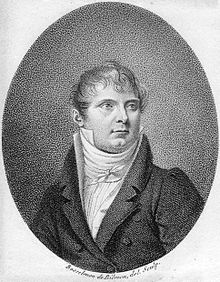- Jérôme-Joseph de Momigny
-
Jérôme-Joseph de Momigny (20 January 1762 – 25 August 1842) was a Belgian/French composer and music-theorist.
He was born in Philippeville, Belgium, and composed music and wrote books, which he printed himself. He was very good at writing poetry and other types of books.
His theories about rhythm and musical phrasing were ahead of his time. From 1803 to 1806 he published his most notorious work Cours complet d'harmonie et de composition, d'après une théorie neuve et générale de la musique (in 3 volumes). It features, among others, a new theory about the significance of the upbeat over the downbeat, which was later taken up by Hugo Riemann. Stressing the upbeat instead of the downbeat as commonly taught, gives a jazzlike and fluid quality to all music. This upbeat-phrasing is one of the main characteristics of jazz, but a few classical interpreters use it as well.
He died in France in 1842 in the Charenton asylum.
Bibliography
- Albert Palm, Jérôme-Joseph de Momigny: Leben und Werk, Ein Beitrag zur Geschichte der Musiktheorie im 19. Jh., Köln, Arno Volk Verlag, 1969
- Glenn Gerald Caldwell, Harmonic Tonality in the Music Theories of Jerome-Joseph Momigny, 1762-1842 (Studies in the History and Interpretation of Music, v. 79) (2001)
- Jacques Chailley, Un grand théoricien belge méconnu de la musique: J-J de Momigny, Bruxelles, 1966

This music theory article is a stub. You can help Wikipedia by expanding it.

